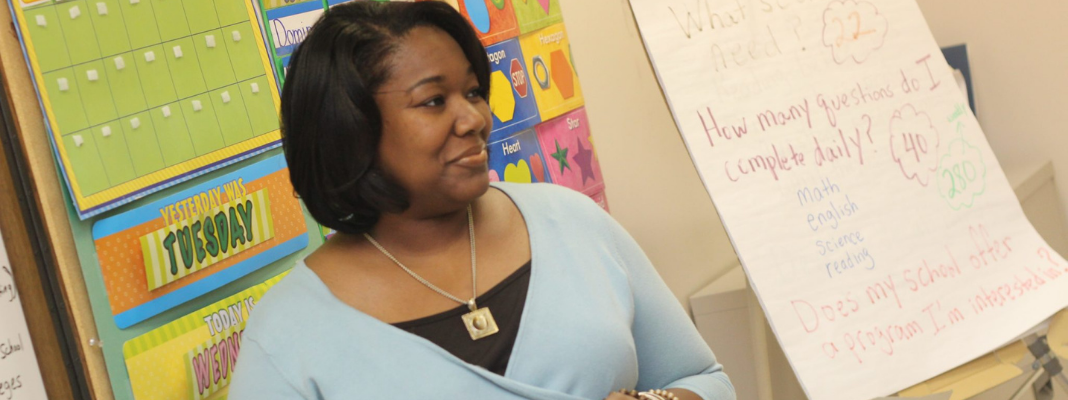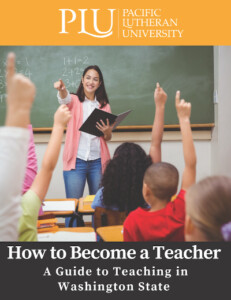How to Become a Teacher in Washington State — What You Need to Know

Even if you’re convinced that teaching is the career path for you, you may be wondering how to get started in the meaningful field of education -- especially if you have your sights set on securing a teaching position in a sought-after location like Tacoma, Washington.
You may have questions, such as: How do I become a teacher in Washington state? Do you need a master’s to teach in Washington state? What are the requirements to be a teacher in Washington state?
We’re here to guide you through the process! Let’s talk about the requirements for becoming a teacher in Washington state and how getting a master’s degree in education will prepare you to secure a successful career.
There are four basic things to check off your list as you move toward a teaching career.
1. Earn a bachelor’s degree from a regionally accredited college or university.
The first step toward a teaching career is completing your bachelor’s degree from a recognized or accredited institution. While you must have a bachelor’s degree to teach in Washington, you do not need to have an undergraduate degree in education or any prior experience with education in order to pursue a teaching career.
2. Complete a state-approved teacher preparation program.
In Washington state, teacher prep programs act as an intermediary between a prospective teacher and the state of Washington. When you successfully complete a teacher prep program, the program endorses you to the state as qualified to teach in a specific subject area.
Not all teacher preparation programs are approved by the State of Washington Professional Educators Standards Board to offer endorsements in every subject area. Teacher prep programs are approved to endorse on a subject-by-subject basis so choose a teacher preparation program with your preferred subject area for teaching in mind.
3. Take two standardized tests for educators: WEST-B and WEST-E (or NES).
Taking the required standardized tests can be a barrier for many prospective teachers. The WEST-B assesses your basic skills in reading, writing, and mathematics. The WEST-E (or NES) is a content knowledge assessment designed to test your knowledge in the subject area you plan to teach.
While the WEST-B is still required for admission to a teacher preparation program and for certification, there is no longer a requirement to meet a specific score while testing. Recent legislation changed the requirement in order to reduce undue barriers for those wishing to teach. Now, schools are allowed to use alternative evidence to determine if you meet a basic skills requirement.
This is a big step in the right direction for creating a more equitable teacher certification process, and it is great news for all prospective teachers who have worried about the testing element of the process.
4. Apply for your initial teaching certification, the Residency Certificate.
Once you’ve taken the standardized tests and completed a teacher prep program, you’ll be eligible to formally submit an application for your certification. This step requires you to submit documentation from your bachelor’s degree, exams, and prep program, as well as complete a background check. Once your application has been processed, you will be certified to teach in Washington state!
For more information about the possible paths to teacher certification in Washington state and associated requirements, check out this detailed resource.
Here's why you should become a teacher in Washington state!
According to the National Education Association (NEA), the average teacher’s salary in Washington state during 2020-21 was approximately $72,000. This is about $10,000 more than the national average salary for teachers, which is about $62,000 — according to the Bureau of Labor Statistics.
Many teachers grow their salary after gaining experience in the classroom, so there is always room to increase your earnings as your career progresses. Further, it’s important to keep in mind that teaching salaries will differ — not only based on level of experience — but also on area of specialization and location. For instance, teachers working in a private school in Tacoma will make more than teachers working in a public school in a more rural area.
Note: Check out our blog to explore teaching jobs in Washington state.
Getting a master’s degree in education gives you the chance to work for diversity and positive social change.
Teaching is a career you can grow into for the long-term. A skill for teaching, like a skill for writing or a skill for critical thinking, never loses value.
School systems will always need high-quality, passionate teachers.
Compassion, empathy, communication, and respect are life skills that are learned early on in homes and classrooms. As America’s classrooms become more and more diverse, there is a growing need for teachers who are willing to navigate the cultural and social complexity of the diverse classroom. You can develop the skills needed to positively impact the education system by getting a master’s degree in education.
Note: Interested in learning about financial aid options for teachers? Check out our blog — Understanding Loan Forgiveness, Grants and Scholarships for Future Teachers.
Become a Teacher in Washington State — Connect With PLU!
There’s no time like the present to invest in your teaching career and invest in the next generation of American students. An advanced degree in education prepares you to be an excellent teacher, offers you greater opportunity and flexibility long-term, and allows you to create a career and a life of deep impact, one child and one classroom at a time.
We offer three pathways to becoming a teacher, MAE — Teacher Certification, MAE — Alternative Routes, and MAE — Non-Certification for International Students. All three programs prepare you with a strong theoretical foundation and real classroom experience. Our intense coursework and schedule provides you with rigorous preparation to gain the skills to become an effective teacher and educator.
If you are interested in learning more about joining a community of education experts at PLU, we encourage you to schedule a one-on-one appointment with us! You can also request more information or start your application today. Lastly, you can sign up to attend an MAE information session at PLU.



